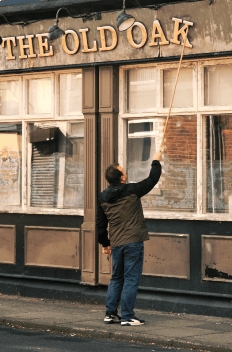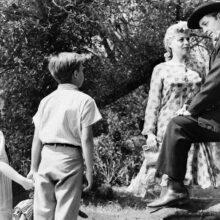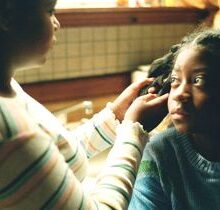

A pub owner in a depressed town in northern England helps welcome Syrian refugees into the community.
British director Ken Loach announced his retirement a couple years ago, at the age of 86. Like everything else in his remarkable career, this was a modest and well considered decision. With 26 feature films, plus numerous shorts and TV programs, he’s been an important presence in cinema for 60 years—one of only ten directors to win the Golden Palm at Cannes twice. But because he never stopped making movies about the lives of working class people, their problems and underlying issues; and didn’t make genre films, such as action, suspense, or horror; his work didn’t get as much attention from moviegoers as it deserved. His final film is called The Old Oak, and it exemplifies the humanism that has always marked his work.
Here’s the story. When a busload of Syrian refugees arrives in a depressed former mining town in northern England, there are those in the neighborhood who are hostile. Resentful at the loss of their community and livelihoods, they don’t like seeing foreigners being helped when the town itself is in such need. As we learn eventually, the inhabitants are living in poverty and desperation, resulting from the end of the mining industry that used to employ the people.
There is one guy, middle aged, nicknamed TJ and played by Dave Turner, who’s not hostile to the newcomers. He’s the owner of the town pub The Old Oak, a very popular spot in town, and is well known to everyone as a friend and a long-time union organizer.
The Syrian refugees have a hard time adjusting to their new home—they need help with lodging first, and then basics like food, health care, and school for the kids. Many don’t know any English, which makes things even harder.
There is one young Syrian woman, Yara (played by Ebla Mari) who knows English well, and loves photography. But when the refugees arrived, a local man grabbed her camera away from her because she was taking pictures of him, and then broke it, refusing to pay for the damage. T.J sees this situation, feels frustrated, and eventually offers Yara the use of one of his father’s cameras, then to pay for hers to be fixed.
The screenplay is by Loach’s frequent collaborator Paul Laverty, who’s great at writing dialogue that sounds natural in the mouths of ordinary people, blunt but flavorful. Loach gives the movie an unhurried rhythm that gradually reveals the character’s past lives and background. T.J. is a lonely man whose wife divorced him. His adult son won’t talk to him. His best friend is his little dog. Yara’s father was taken to prison in Syria. She doesn’t know if he’s alive. These two very different people, the pub owner and the refugee, form a friendship. Together they plan ways to help the kids in the town, both native and immigrant. They pool the community’s resources to remake a former union hall in the back of The Old Oak into a pantry to feed the kids.
Now the regulars at the bar, the good old boys that bantered with T.J. and spent all day drinking and talking, refuse to accept the Syrians, and are angry with T.J. for helping them. They want to sabotage his plans. And thus in the midst of neglect, people turn against one another.
The cast is impeccable. The film offers no false optimism, but it does show us people that are still capable of goodness and decency. The Old Oak is about solidarity, and its difficulties—a fitting cap to the career of a distinguished filmmaker.






